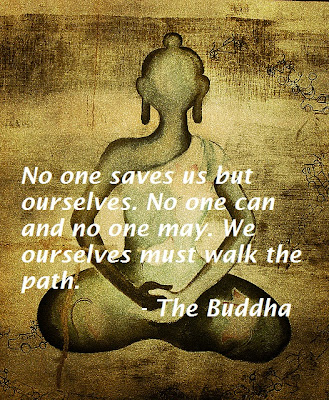1. What is Righteousness.
- Once when the Lord was on an alms-pilgrimage in Kosala, with a great train of almsmen, he came to a Brahmin village of the Kosalans named Sala.
- It came to the ears of the Brahmin heads of families in Sala that the Blessed Lord had come to their village in the course of an alms-pilgrimage in Kosala.
- They felt it was good to go and visit him. So the Brahmins of Sala went to the Lord and, after exchanging civil greetings, took their seats on one side.
- They asked the Blessed One if he would explain to them what he meant by righteousness.
- So to the attentive Brahmins the Lord said : "There are three forms of unrighteousness and wickedness for the body ; four for speech ; and three for thoughts.
- " As regards bodily unrighteousness, a man (i) may take life, as a hunter with hands bathed in blood, given to killing and slaying, merciless to living creatures ; or (ii) may take what is not his, by appropriating to himself in thievish fashion the belongings of other people in village and jungle ; or (in) may be a fornicator, having intercourse with girls under the charge of mother or father or brother or sister or relations, yes, with girls affianced and plighted and even wearing the very garlands of betrothal.
- " As regards unrighteousness of speech a man (i) may be a liar; when cited to give testimony before assembly or village-meeting or family council or royal household or his guild, he may say that he knows when he does not know, or that he does not know when he does know, or that he saw when he did not see, or that he did not see when he did see, deliberately lying in the interests either of himself or of other people or for some trifling gain. Or (ii) he may be a slanderer; repeating here what he has heard elsewhere so as to set one set of people by the ears, and repeating elsewhere what he has heard here so as to set another set of people by the ears ; he is a dissolver of harmony and a omenter of strife; discords prompts his utterances, discord being his pleasure, his joy, and his delight. Or (iii) he may be bitter of tongue; what he says is rough and harsh, hurtful and wounding to others, provocative of anger, and leading to distraction. Or (iv) he may be a tattler talking out of season, without heed to fact, always talking of the unprofitable, never of the Doctrine, never of the Rule, but ever of the trivial, of the ill-timed of the frivolous, of things leading nowhere, and unprofitable.
- " As regards unrighteousness of thought, a man (i) may be covetous, coveting other people's gear with the yearning that it were all his own. Or (ii) he may be malevolent and wicked of heart,—wishing that creatures around him might be killed, destroyed, annihilated, or cease to be. Or (iii) he may be wrong in outlook and erroneous in his conceptions—holding that there are no such things as alms or sacrifice or oblations, that there is no such things as the fruit and harvest of deeds good and bad, that there is no such thing as this world or any other, that there are no such things as either parents or relations elsewhere, that there are no such things in the world as recluse and Brahmins who, having trodden the right path and walked aright, have, of and by themselves, comprehended and realized this and other worlds and made it all known to others too.
- "Contrariwise, there are three forms of righteousness and goodness for the body; four for speech and three for thoughts.
- "As regards bodily righteousness, a man (0 puts from him all killing and abstains from killing anything; laying aside cudgel and sword, he lives a life of innocence and mercy, full of kindliness and compassion for everything that lives. (ii) Theft he puts from him and eschews taking from others except what is given to him by them, he lives an honest life. (iii) Putting from him all sensual misconduct, he abstains from fornication; he has no intercourse with girls under the charge of mother or father or brother or sister or relations, no intercourse with girls affianced and plighted and with the garlands of betrothal upon them.
- "As regards righteousness in speech,
(ii) All slander he puts from him and from slandering he abstains; what he hears here he does not repeat elsewhere so to set one set of people by the ears, nor does he repeat here what he hears elsewhere so as to set another set of people by the ears, he is a promoter f harmony and a restorer of amity, for concord is his pleasure, his joy, and his delight.
(iii) There is no bitterness in his tongue and he abstains from bitter speech; what he says is without gall, pleasant, friendly hearty, urbane, agreeable, and welcome to all.
(iv) No tattler, he abstains from tattle, speaking in season, according to fact, always of the profitable, of the Doctrine and Rule, in speech which is seasonable and memorable, illuminating, well-marshalled, and of great profit.
- " As regards righteousness in thoughts,
(ii) He harbours no malevolence or wickedness of thought; his wish is that creatures around him may live on in peace and happiness, safe, from all enmity and oppression.
(iii) He is right in outlook and correct in his conceptions.
- " This is what I mean by righteousness and unrighteousness."








































.jpg)

.jpg)






